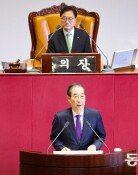Migrant Workers Help Less Fortunate Koreans
Migrant Workers Help Less Fortunate Koreans
Posted February. 17, 2007 07:26,
Those who have had to endure pain themselves can fathom the depth of someone elses suffering. When you share the joy, it doubles, and when you share the sorrow, it halves. Such individuals can feel this from the bottom of their hearts without even thinking about it.
Axmon Community Service (ACS) is made up of 20 foreign workers from Bangladesh. The workers, who came to Korea in search of the Korean dream, spend most of the day at a factory and spend the rest of their time in a tiny room. However, they take a very special trip on the fourth Sunday of every month. Their destination is a mentally handicapped care facility where they have been volunteering for the past five years.
They first began their voluntary activities in September 2002, when the entire nation was hit hard by Typhoon Rusa. The Bangladeshi workers who were working for factories in Seongsu-dong, Seoul while living together in a handful of small rooms, watched the flood-stricken areas of Gangwon Province on television. They felt a sudden surge of grief as it was reminiscent of their home country.
Bangladesh is inundated by floods three to four times a year. People lose their houses and all of their household belongings. Moreover, neighbors die one after another, said Nadim, the president of ACS.
Shortly after, a dozen Bangladeshi workers decided to go and help the flood victims they saw on TV. However, none of them knew where Gangwon Province was located. They went to the Oksu Community Center and borrowed a mini-bus for their trip to Gangwon Province and bought relief food. Each person contributed about 40,000 won ($43). This was not a small amount of money for them since they earned about one million won a month and wired 60 to 70 percent of what they earned to their families back home.
The following year, they launched ACS. Sodan, 32, who worked for the Red Cross of Bangladesh, played a pivotal role, and Bangladeshi workers in Seongsu-dong joined hands together. They used the word Axmon, which means one mind in Bangladeshi, as the name of their new organization.
The members of ACS have been visiting Nagnezip, a community center for mentally handicapped people in Hanam, Gyeonggi Province, on the fourth Sunday of every month consecutively since September 2003 without ever missing a day.
Some 60 handicapped people ranging from teenagers to those in their 90s are sheltered at Nagnezip. When unfamiliar-looking migrant workers first visited them, they did not pay an ounce of attention towards them.
However, they soon let their guard down. The members of ACS began to embrace their lonely hearts while calling them grandma and grandpa, or brother and sister in Korean. They soon became a family.
I think they could become close to each other faster than other volunteers because they have developed a sense of kinship, possibly because both sides are not fluent in Korean, said Lee Nan-ae, 49, a nurse of the center.
Addaul huk, 39, who has been in Korea for eight years, has been exclusively in charge of giving baths, though it is considered to be the most arduous job. Addaul says the people who rush to take a bath give him energy that lasts for an entire month.
When I do community work, I feel joy the following week, even though I might be physically exhausted. Spending just a little time together makes them smile, and it makes me feel happy, too. It makes me forget about my loneliness, Addaul added.
The members of ACS had to undergo a painful separation last month. Sodan, who had been in charge of all internal affairs of ACS, was deported.
Sodan, who was overstaying in Korea, was asked to produce identification by the police on the street. He was sent to the Immigration Office and then deported to Bangladesh in a week.
However, Sodan made a phone call at the airport to a local Red Cross community center that supports ACS and expressed his gratitude. I spent most of my life just for myself, but I learned a little bit about how to spend my time for others in Korea, Sodan said on the phone.
Other members have also been suddenly deported to Bangladesh. Some of the remaining members might also get deported once they get caught by the immigration office.
However, they say they will continue to serve the Korean community.
I am not sure how much longer I can stay in Korea. But I will continue my community service. Sharing is not just helping others; it is a process of acknowledging one another. It doesnt matter whether you are Korean or not when it comes to sharing. We are all the same people, Nadim said.
gaea@donga.com







